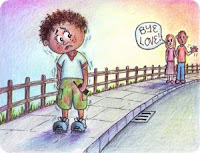Help for Emotionally Hypersensitive Children on the Autism Spectrum

"Any help here for parenting a super super sensitive child with autism - especially when he is given a (mild) consequence for throwing a wild tantrum?" Has your child with Asperger’s (AS) or High-Functioning Autism (HFA) ever been labeled as "highly emotional" or “melodramatic” by others? Does he enjoy quiet play more than big and noisy groups? Does he ask lots of questions? Is he incredibly perceptive, noticing most of the minor details of life? Does your youngster want all the tags pulled out from his shirts? If you answered yes to any of the above, you may be raising an emotionally hypersensitive youngster – but that’s not a bad thing! Emotionally hypersensitive kids may not have all the traits listed below – and they may have the traits to differing degrees – but they all require special parenting techniques to enable them to function effectively: Above average ability in one or more areas, even if not evident in schoolwork Bedwetting beyond typ




